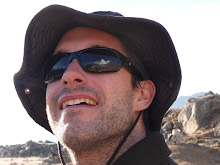I arrived at San Salvador airport late Sunday night and was picked up by a friend, Rafa. Rafa gifted me a Spanish book as he drove me to my host family (with a quick stop over for a Pilsner beer at his friend’s home). The drive was humid, quiet and pleasant – down tree-lined streets through mostly middle and upper-class neighborhoods. It reminded me of my night-time arrival in Caracas, Venezuela, with homes lighting up the hills that surround the city.
I could tell just from the drive that this would be a new experience for me. Typically, when arriving in the developing world I flee cities as fast as I can, preferring the tranquility, culture and sense of adventure that come from the open road and small towns and villages. During this trip, I will be centered in the metropolis of San Salvador, population 1.8 million, the largest city I have ever lived in, surpassing both Milwaukee and Washington, DC.
After getting a little lost, Rafa and I arrived at my host family’s home in the Miralvalle neighborhood, a quasi-gated community (there’s a guard but no gate) in north-central Sal San Salvador. Don Angel and Dona Rosa, a couple in their sixties/seventies welcomed me warmly at around 10pm. Already I can tell that they embody the reputation El Salvadorenas have of being kind and welcoming to foreigners. After chatting briefly, I headed off to bed.
Monday morning Rosa escorted me to my language school like a mother accompanying her child to his first day of elementary school. She rode the bus (a colorful converted school bus, like the chicken buses in Guatemala -- cost = $0.20) with me and walked me to the school’s front door. As we rode and walked, Rosa offered her advice:
- Keep your back-pack in front of you on the bus
- Don’t carry too much cash
- Have change for the bus in hand so no one sees you going through your wallet
Most of the advice I seem to be getting from Rosa and others seems to be security-related. At school the admonitions were the same: be aware of thieves; don’t be out alone at night; don’t go into certain neighborhoods because of the gangs (“MS-13” and “18”). To be honest, while I was listening, I found myself discounting the warnings. Having traveled enough at this point in my life, I tend to either underestimate or more accurately estimate risks in developing countries, whichever way you want to look at it. Most of the other students and travelers I have met so far are in the developing world for the first time, so I think the advice is sage – better to be a little safer to begin with. But I also tried to remind myself that urban living in the developing world is a new experience for me.
Whether there is fear or not, there is a palpable sense of insecurity in the city. I live in and go to school in a world of high walls, iron gates, and sometimes armed guards and barbed wire – and this is the nice part of town. I haven’t been here long enough to fully grasp the origin of this insecurity, but principally it seems that residents of San Salvador have reason to fear street crime and gangs. It makes me think of Baltimore, where you see bars on the windows in most areas of the city but generally feel pretty safe.
I have my language classes with a student from Taiwan named Paihsin, and a community organizer from New York, Antonietta. We have a good rapport and a great teacher in Maribel. At the end of the first day I realized I had made a list of over 100 new verbs and other vocab words, and the list burgeoned further over the week. I can tell this will be a steep learning curve, and with a sustained effort I have high hopes that my level will be superior by the time I complete my 12 weeks here.
For a bit of drama, on my way home from my first day of classes I tried to force too many errands into the afternoon and found the sun setting as I tried to navigate my new neighborhood. Darkness began to envelope me as a realized I had taken a wrong turn. Attempting a short-cut home made matters worse as I wandered into a fringe area of my neighborhood. Just as I realized the route was a dead-end, I learned a security lesson that had nothing to do with crime or gangs: before I knew it, a vicious dog had descended on me. It is the first time I have been attacked by a dog and one of the more heart-stopping experiences of my life. I don’t know if I started yelling out of fear or to give it a taste of its own medicine, but when my decibel level eclipsed that of the dog, it finally backed off. I made my way out of the area quickly and found my way home.
It´s now Friday, at the end of my first week, and everything is coming along really well. I am meeting today with my counterpart from VisionSpring to launch my internship; I am figuring out the bus system so I can make my way around the city (there are no obvious bus stops, you just have to know where they stop); I have been trying to get in touch with my local Rotary host and will hopefully reach her soon. What is more, I have had some really fascinating experiences visiting museums, chatting with a former child soldier of the revolution and a young man living on the street, and talking politics with classmates, teachers and my host family. It has been a whirlwind of a week and I look forward to giving more updates soon. I will also start taking pictures and video to spice things up.



